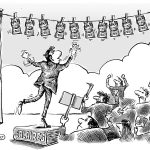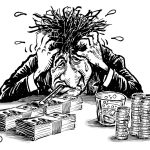The Three Arrows of the Jinpingnomics
The assault on BATX is just one aspect of Xi Jinping’s economic and political plan.
“A monarch is powerful when his People is happy,” wrote Simonnet de Maisonneuve in one of his long-forgotten tragedies1. It seems that for a few months now, and between now and the meeting of the Communist Party Central Committee in the fall of 2022, President Xi Jinping has been trying to implement this adage by putting his economy in order and improving the well-being of his fellow citizens. The campaign of regulation aimed at the “Big Tech”, launched several months ago, crystallizes the objectives pursued by the President.
Let’s review them, and see how they unfold. They could be grouped in three “arrows”: “common prosperity”, “national security” and a “new era of development”. Improving the economic conditions of the population, reducing inequalities, requires the protection of personal data, the control of the uses of video games, the limitation or even the dismantling of the big Big Tech monopolies, the opening of their databases to other market players (SOE, start-ups) in order to develop a fluid and competitive ecosystem, able to offer the population goods and services at the best prices. It is also about getting Big Tech to treat their employees better and forcing them to share value more equitably with sellers and producers who use their platforms. Concretely, a company like Meituin, is “encouraged” to better pay its deliverers. Alibaba and Tencent will have to share their personal data sources and make the passages between the different applications more fluid. This is not necessarily to displease consumers, the first concerned, especially after many scandals of fraudulent use of their personal information, or faced with their exasperation with recommendation algorithms. However, protection also means strengthening controls and the control of citizens by the public authorities.
While there is no shortage of wood for his arrows, President Xi is not guaranteed to hit all his targets.
Such measures, to which we can add the new regulations against Fintech or the end of profits for online education companies, also serve President Xi’s two other objectives: to encourage these companies to direct an increasing share of their investments towards the “new development model” desired by the government; ensure that they contribute to the strengthening of “national security” – whose geostrategic dimension of challenging the “American order” no longer escapes anyone. China openly displays its technological ambitions: to catch up and surpass the United States in the fields of semiconductors, quantum computing, space conquest etc. Finally, national security consists in limiting – or even prohibiting – the IPOs of these companies rich in the personal data they hold – a raw material essential to the Middle Kingdom, and treated as such.
The price to pay: collapsing stock prices (Alibaba has lost nearly 40% of its value since the beginning of the year); increased interventionism in the organization and management of these enterprises; the risk of scalded foreign capital withdrawing permanently from the market; a decline in investment due to lack of resources and even worse dynamism, due to the dispersion of efforts. Such a “Great Leap Forward” incentives are not to reassure. Certainly the means and the level of technological advancement have nothing in common with the disaster of the late 50s, and already large groups such as Huawei – around 6G – intend to raise the glove. However, the economic and regulatory re-order initiated in this sector is not without danger.
In addition, the near-bankruptcy of the real estate group Evergrande also weakens the promise of prosperity built on access to housing for all. Faced with the President’s ambitions, is China not threatened by a recovery that is far too restrained and mediocre due to a permanently sluggish domestic demand?
While there is no shortage of wood for his arrows, President Xi is not guaranteed to hit all his targets. As external tensions rise, which ones will he have to give up?
1 Odmar and Zulma (1788)
Original french version article in allnews.ch Dated Sep 22 2021 Cartoon Barret



